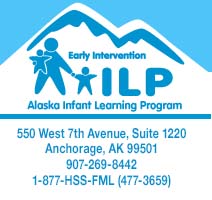
Medical Providers
General information about program
The Individuals with Disabilities Act (IDEA) requires states to develop and implement early intervention programs for infants and toddlers from birth to 3 years of age with disabilities or delayed development. Services for young children with developmental delays can often reduce the need for later special need services. EI/ILP encourages early identification and prompt referral of any infant or toddler with developmental delays in one or more areas of physical, cognitive, social/emotional, or adaptive development. Certain diagnosed conditions pre-qualify children because of the high probability of developmental delays. Conditions which have a high probability of 50% developmental delays include:
- Chromosomal abnormalities or genetic conditions associated with severe delays in development such as Down Syndrome, Prader-Willi, Cornelia de Lange Syndrome, Turner Syndrome, or Fragile X Syndrome
- Syndromes and conditions associated with severe delays in development such as fetal alcohol syndrome
- Neurological disorders such as: Cerebral Palsy, Microcephaly, Hydrocephaly, Spina Bifida, Periventricular Leukomalacia (PVL), Complex Seizure Disorder, and CNS Degenerative Disorder
- Sensory conditions or disorders that result in significant or progressive vision and hearing impairments and which interfere with the child’s ability to respond effectively to environmental stimuli
- Congenital infections such as: Rubella, Cytomegalovirus (CMV), Toxoplasmosis, Acquired Immune Deficiency Syndrome (AIDS) or HIV Positive
- Chronic illness or progressive conditions which severely limit learning and development such as Cystic Fibrosis, Bronchopulmonary Dysplasia (BPD), tracheostomies, arthritis, Muscular Dystrophy, and Congenital Heart Disease
- Psychosocial disorders such as: Reactive Attachment Disorder, Infant Autism, and Childhood Schizophrenia
- Atypical growth patterns consistent with a prognosis of significant developmental delay based on professional judgment
- Maternal conditions that result in severe delays in the child, such as uncontrolled maternal PKU
Once referred by a medical provider or family the child receives an assessment by a multi-disciplinary team which may include physical therapist, speech therapist, occupational therapist, and/or developmental therapist, and an Individualized Family Service Plan (IFSP) is developed for eligible children. No child is turned away because of inability to play, however, Medicaid or private insurance may be billed for some services.
